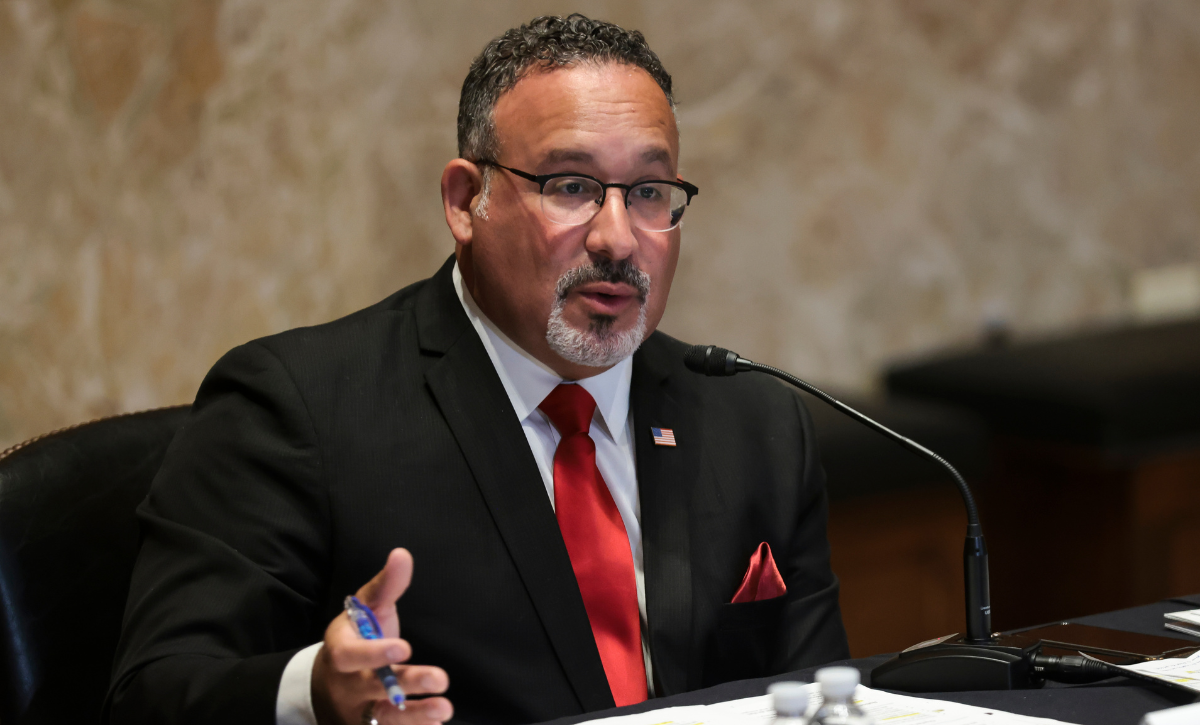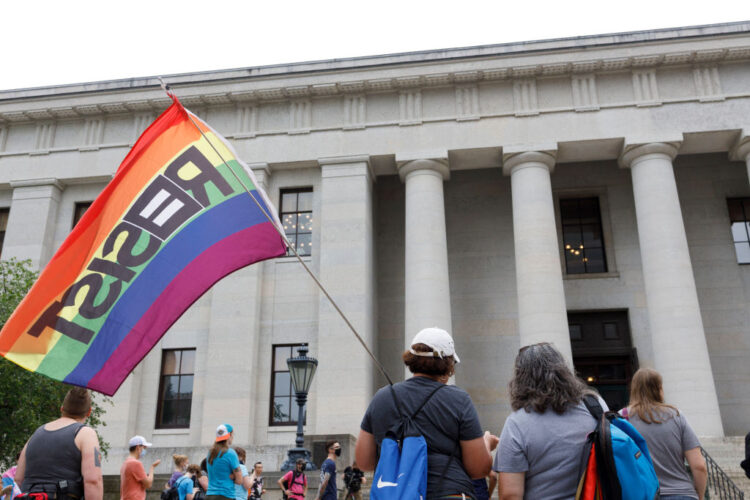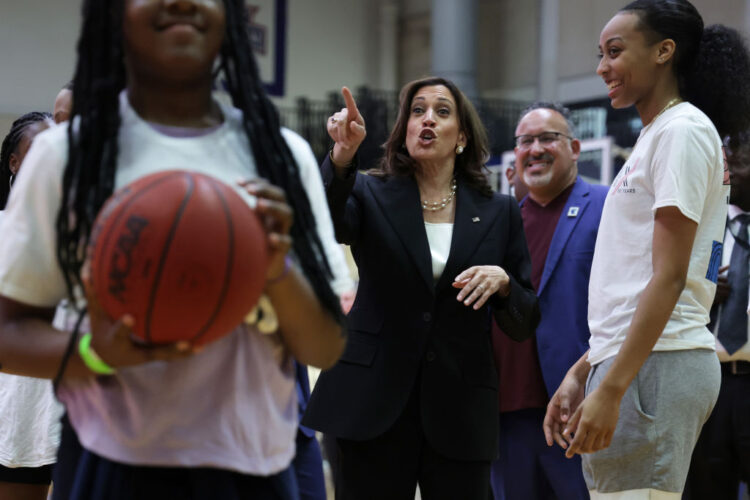Biden Administration’s New Title IX Rules Expand Transgender Student Protections
While undoing some Trump-era provisions aimed to protect the rights of those accused of sexual harassment, the proposal sidesteps athletics — for now

Get stories like this delivered straight to your inbox. Sign up for The 74 Newsletter
The Biden administration is pursuing sweeping new changes to federal Title IX law to restore “crucial protections” for victims of sexual harassment, assault, and sex-based discrimination that it maintains they lost during the Trump administration.
Under the proposed changes, announced Thursday, the law would protect victims against discrimination based not just on sex but on sexual orientation and gender identity, in effect adding transgender students as a protected class. Current regulations are silent on these students’ rights.
But the proposal sidesteps the question of transgender athletes’ rights to compete in girls’ sports, an explosive issue administration officials said will get its own set of regulations at a later date.
“This is personal to me as an educator and as a father,” U.S. Education Secretary Miguel Cardona said during the announcement. “I want the same opportunities afforded to my daughter and my son — and my transgender cousin — so they can achieve their potential and reach their dreams.”
The changes come 50 years to the day after President Richard Nixon signed the federal civil rights law that bans sex discrimination in education.
Cardona on Thursday noted that LGBTQ youth “face bullying and harassment, experience higher rates of anxiety, depression, and suicide, and too often grow up feeling that they don’t belong.”
The proposed regulations, he said, “send a loud message to these students and all our students: You belong in our schools. You have worthy dreams and incredible talents. You deserve the opportunity to shine authentically and unapologetically. The Biden-Harris administration has your back.”
Education and civil rights groups welcomed the proposed rules, with Ronn Nozoe, CEO of the National Association of Secondary School Principals saying they “greatly strengthen principals’ abilities to ensure schools provide what students need.”
Amit Paley, CEO of The Trevor Project, a suicide prevention and mental health organization for LGBTQ youth, applauded the administration’s bid to extend Title IX protections to sexual orientation and gender identity, saying, “School should be a place where students learn and are comfortable being themselves, not a source of bullying and discrimination.”
But the proposed rules irked some conservative groups. In a statement, Nicole Neily, president of Parents Defending Education, called the move a “federal overreach” and dubbed the proposed regulations “The Biden administration’s ‘Must Say They’ rewrite of Title IX,” refering to the preferred pronoun of some who are transgender.
“American families should be deeply concerned by the proposed rewrite of Title IX,” Neily said. “From rolling back due process protections, to stomping on the First Amendment, to adding ‘sexual orientation and gender identity’ into a statute that can only be so changed by Congressional action, the Biden Administration has shown that they place the demands of a small group of political activists above the concerns of millions of families across the country.”
Taken together, the proposed regulations would create a sharp contrast to Trump administration rules adopted in 2020 under then-Education Secretary Betsy DeVos. Under DeVos, for instance, schools were prohibited from opening Title IX cases if an alleged assault took place away from school grounds. Under the new rules, schools would be required to address “hostile environments” in programs and activities, even if the conduct that contributed to the hostile environment “occurred off-campus or outside the United States,” a senior official told reporters.
“Our view now is that the existing regulations do not best fulfill Congress’ mandate in Title IX,” the official said. “There is more we can do to ensure that students do not experience sex discrimination in school.”

Cardona’s proposed changes both expand the definition of sexual harassment and potentially limit opportunities for students accused of sexual assault or harassment to confront their accusers. Administration officials said the new regulations would require schools to take “prompt and effective” action on campus sex discrimination.
But they also said the regulations in effect loosen requirements on schools’ sex assault investigations: The proposed rules, for instance, would “permit but not require” schools to hold live hearings in which accused students can directly confront survivors.
A senior department official, who briefed reporters Thursday on background, said the administration has concluded that a live hearing, which resembles a courtroom procedure, “is one, but not the only way, to address investigation and to determine what has occurred.” The official noted that the vast majority of schools were not conducting live hearings before the Trump administration began requiring them in 2020. “And it was clear to us that a live hearing was not essential to determination of outcomes and a fair process,” the official said.
In a statement, Sen. Richard Burr (R-NC), said the move “returns to the deeply flawed campus disciplinary process of the Obama Administration, which led to hundreds of inconsistent judgements and more than 300 legal challenges. The existing rule struck a balance that follows the law and is fair to both parties.”
Notably absent from Thursday’s announcement was any mention of Title IX’s application to athletics, which has caused a furor due to a handful of transgender athletes’ bids to compete in girls’ sporting events.
The administration said it will engage in a separate rulemaking process to address the law’s application to athletics and gender, but offered no immediate timeline for the process. A senior department official said the topic “deserves its own separate rule-making process.”
Administration officials have previously said Title IX, which prohibits sex discrimination and harassment in programs receiving federal funds, will echo the Supreme Court’s 2020 decision in Bostock v. Clayton County, Georgia, which extended protections against sexual harassment and discrimination in the workplace to LGBTQ employees.
While the department’s interpretation of the Bostock ruling doesn’t mention sports, the Biden administration last year filed a brief in a West Virginia case in which a transgender girl who wants to compete with girls on her middle school cross country team is challenging the state’s 2021 law banning students born as male from participating in girls’ sports.

A group of 15 Republican-led states, led by Montana Attorney General Austin Knudsen, has threatened to challenge the regulations in court,. Since last year, a dozen states have passed legislation prohibiting trans females from competing in girls’ and women’s sports.
Last week, the International Swimming Federation, the world governing body for swimming, voted to prohibit transgender athletes from competing in high-level women’s competitions unless they began medical treatments to suppress testosterone production early in their lives.
The group, known internationally as Fédération internationale de natation, or FINA, said it would also establish a new, “open” category for athletes who identify as women but do not meet the requirement to compete against people who were female at birth.
By contrast, World Cup and Olympic soccer star Megan Rapinoe told TIME last week that she is “100 percent supportive of trans inclusion” in sports, noting that what most people know about the topic comes from “relentless” conservative talking points that don’t reflect reality.
“Show me the evidence that trans women are taking everyone’s scholarships, are dominating in every sport, are winning every title,” she said. “I’m sorry, it’s just not happening. So we need to start from inclusion, period. And as things arise, I have confidence that we can figure it out. But we can’t start at the opposite. That is cruel. And frankly, it’s just disgusting.”
The public has 60 days to send comments on the new proposal, which could take several months to finalize.
Get stories like these delivered straight to your inbox. Sign up for The 74 Newsletter

;)
